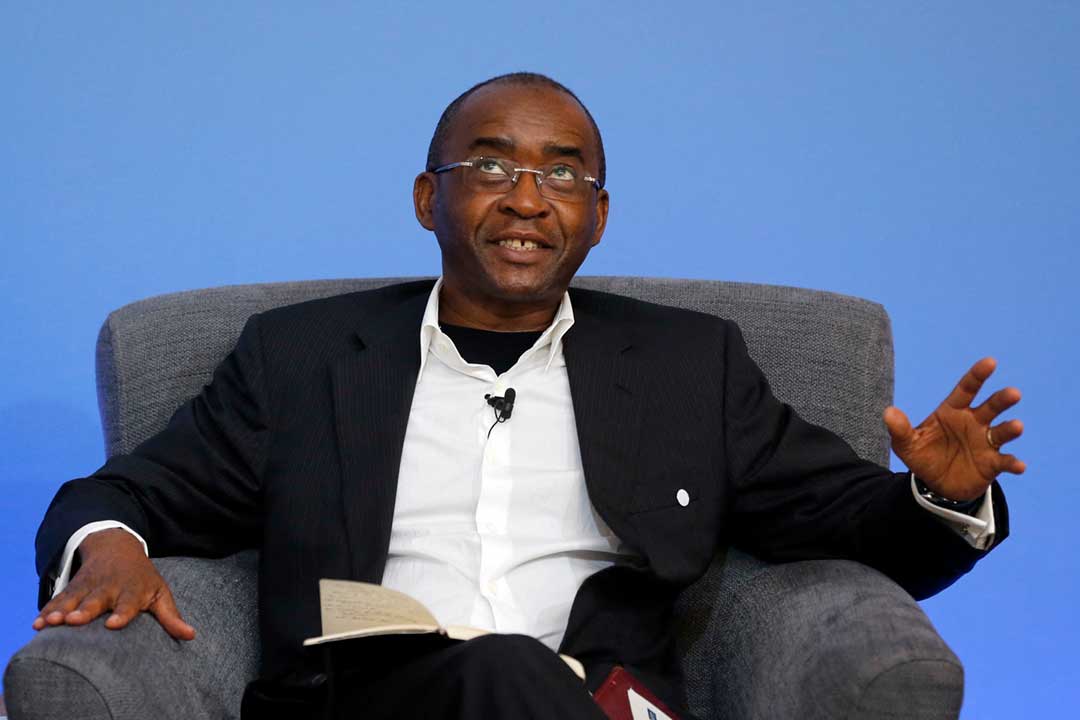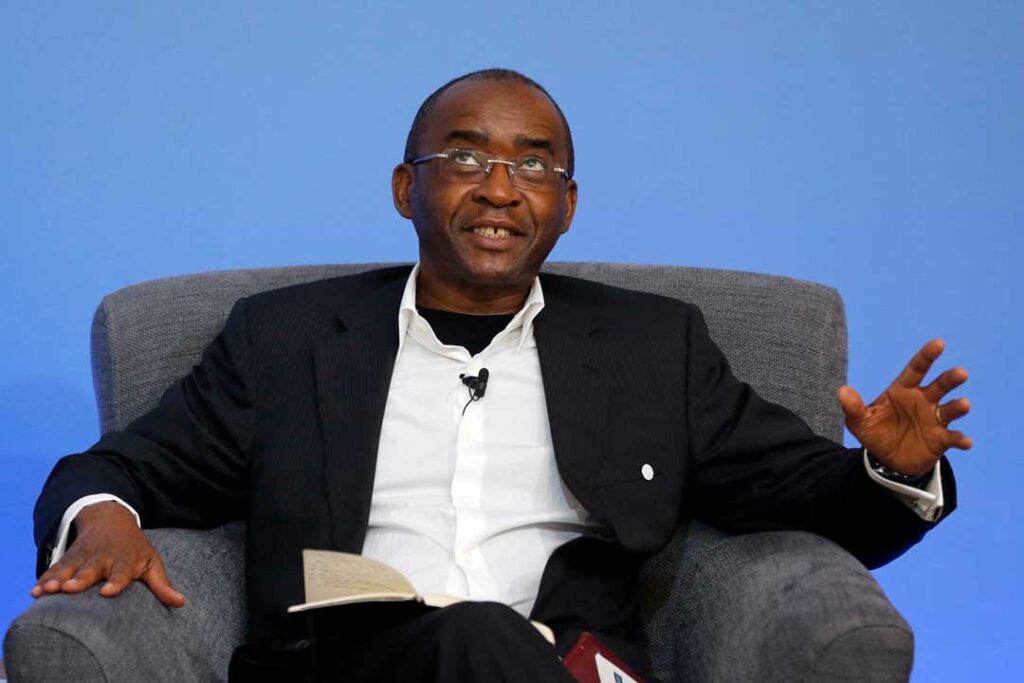Zimbabwe: Strive Masiyiwa
The telecommunications tycoon wins with the law and God on his side
“What Can Be Done Should Be Done And What Can’t Be Done…Must Be Done.” So reads part of the mission statement for the South African-based, Zimbabwean telecommunications mega-outfit Econet Wireless, a global e-buffet in which subscribers, along with making phone calls, may consume a “holistic” array of services including, according to the official website, the “core areas of internet, fixed wireless, fibre cable, satellite transmission, transaction processing services, mobile assurance and money transfer”, that make up this telecoms giant.
Zimbabwe is not a rich country. Its GDP barely reached $7.7 billion in 2013, according to the World Bank. With a population of 12.9m, it is a small country. But it has long functioned as a springboard for southern African ingenuity. It is certainly a hard country, an impossible country every road leads through the intransigence of ZANU- PF and its vast patronage network.
Therefore the man responsible for its “holistic” telecommunications services, the man for whom Econet is not just a vector for earning many hundreds of millions of dollars, but also a statement of ethical and spiritual intent, is admired worldwide. And Strive Masiyiwa, the 53-year-old at the helm of Econet Wireless, is certainly one of the more respected businessmen in Africa. As of this writing, his Facebook page has acquired 321,954 likes not Lindsay Lohan numbers, but virtually unheard of for the founder of a phone company. (His 19,800 Twitter followers are less impressive.)
Strive—his first name sums up the man. Since the early 1990s he has been on the radar of such luminaries as Bill Clinton. In 1995, the then US president called Mr Masiyiwa to the board of the Southern African Enterprise Development Fund, an appointment that served as his debut in international circles. Mr Masiyiwa’s first global moment was a result of his precocious rise in Zimbabwean business circles, back in the days when Zimbabwe was considered an African success story, and Mr Masiyiwa its favourite, if most litigious, son.

He was born in 1961, in a Rhodesia restive with the first rumbles of the Bush War that would eventually unseat Ian Smith’s supremacist regime. When publications describe a businessperson as “self-made”, they are often leaving out an important chunk of biographical data. In Mr Masiyiwa’s case it is his remarkable mother who forms the bedrock of his entrepreneurial esprit. After his war-weary family moved to Kitwe, a town on today’s Zambian copper belt, Mrs Masiyiwa worked on the cusp of that country’s liberation era building a modest empire from retail sales, transportation services and small-scale farming. With the proceeds from these businesses, the Masiyiwas were able to send their son abroad to school in Europe, where he attended a private institution in Edinburgh, Scotland.
The young Masiyiwa, however, had liberation in Rhodesia on the brain. He wanted to return to fight following his graduation in 1978, but was urged not to. “One of the senior officers told me, ‘Look, we’re about to win anyway, and what we really need is people like you to help rebuild the country,’” he informed Time magazine in 2002. Mr Masiyiwa listened to this advice and earned an electrical and electronic en- gineering degree from the University of Wales, cum laude, in 1983. A year later, he returned to a liberated Zimbabwe.
Some context: Zimbabwe in 1984 was a surging African state. While Robert Mugabe was prosecuting the Gukurahundi campaign that resulted in the deaths of many thousands of Ndebele in the country’s western regions, a commitment to education and a solid infrastructural base made it a hotspot for African entrepreneurialism. But it was not, by any means, Shangri-La.
In 1986, when Mr Masiyiwa was looking to make good on his own promise, he found this out the expensive way: in court. He raised $75 from friends and family and started a small electrical contracting business. But as an entrepreneur in the tech field, he faced a problem: across Africa, state after state had a stranglehold on the telecommunications sector, a hangover from the days of post-independence nationalisation, and one of the last bastions of state ownership in an era of structural adjustment- imposed liberalisation.
Mr Masiyiwa went after the Zimbabwean government in court, arguing that the state monopoly was unconstitutional. This was a vicious battle: the state issued arrest warrants on charges of illegally holding telecommunications equipment. When in December 1996 Econet won a ruling ordering the telecoms minister to break up the state-owned monopoly, the resulting open tender process was considered fraudulent, and Econet went back to court to protest it. “Masiyiwa’s Dream Crumbles” screamed a newspaper headline that described the soap-operatic quality of the case and defined Zimbabwe’s shaky coming-of-age in the 1990s.
It was only after the intervention of the late Joshua Nkomo, then vice-president, that the legal and political persecution stopped. “This one is not a sell out. He is [a] true son of Zimbabwe,” Mr Masiyiwa blogged Mr Nkomo as saying of him. And by Decem- ber 1997, Econet won its licence and Mr Masiyiwa his landmark case. This assured his legend as an African trailblazer.
Still, the company needed money, and not Zimbabwean money, but foreign exchange. The idea was to raise capital internationally. A Zimbabwean tech start-up, however, was not exactly a mermaid song for touchy investors. Besides, Econet was lit- erally selling air. In 1998, the notion of Africans carrying cell phones was preposterous, and Mr Masiyiwa was selling the company on an innovation called “prepaid”, which no one in the US, Europe or Africa could understand. But the Econet team persisted. After an international roadshow, they returned to Zimbabwe in 1998 oversubscribed. They raised enough capital to move forward.
Part of what has always made Mr Masiyiwa irresistible to a species of American and European investor is his devout commitment to born-again Christianity. The way Mr Masiyiwa tells it, he fully turned to the Lord when several gunmen abducted him during a trip to Mozambique in 1990. He describes on his blog how he kneeled and prayed for deliverance. When he was set free, he emerged into the light of Maputo as born again. His Facebook page and blog, to say nothing of his speeches, are peppered with references to the scriptures. And while this may seem like a cynical business ploy when trying to raise cash from evangelical oilmen in Louisiana, Mr Masiyiwa is not faking it: he is Christian to his very core.
This almost entirely explains the parallel tracks that his career as a tech entrepreneur and global philanthropist have taken since he turned Econet into one of the first African telecoms giants. By 2000, while Zimbabwe was teetering on the brink of land reform collapse, Mr Masiyiwa made the move to Johannesburg. He set up his flagship, Econet Wireless International. The company quickly diversified into solar energy and fibre optic cables (his Liquid Telecom cable network is the largest in Africa). Its services spread rapidly to 15 countries, including a partnership with South Africa’s MTN in Botswana. In 2000 he took ownership of the then only independent newspaper in Zimbabwe, the Daily News, which was shuttered under government pressure in 2003. And while Forbes claims that Mr Masiyiwa has amassed a personal fortune of $600m, he is not the spendthrift African mogul we have come to know and love.
Along with his wife Tsitsi, with whom he has four sons, he started the Higher Life Foundation, which is responsible for the continued welfare of 40,000 Aids orphans. He sucks up commendations like a vacuum cleaner: in 2003, a Time/CNN poll cited him as one of the 15 Global Influentials of the Year; in 2011 The Times of London named him one of the 25 leaders of Africa’s renaissance; Forbes called him one of the 20 most pow- erful leaders in African business in 2011. US President Barack Obama invited him to the G8 summit at Camp David in 2012. He has Bill Gates on speed dial and is a Rockefeller Foundation trustee. He founded the eHealth programme with Desmond Tutu and the Carbon War Room with Virgin’s Richard Branson. Mr Masiyiwa is as connected as it is possible to be.
One remarkable episode in Mr Masiyiwa’s journey illustrates how his direct line to heaven would appear to be an advantage. In 2000, when Zimbabwe’s economy imploded due to the land reform/farm invasion saga, Econet was on the brink of disaster. There was no money to pay staff, no money to invest in equipment. Inflation hit what economists estimate was around 500 billion percent, give or take a percentage point or two. But when Mr Masiyiwa looked at the books closely, he identified one astonishing trend: “I noticed that the share price of the Zimbabwe company was tracking the hyper inflation! I ‘knew’ then what to do to save the company!” he wrote on his blog.
Mr Masiyiwa and Econet started to use the share price as an “inflation proof” currency. They minted coins, using airtime as a denomination and bought up everything they could—stock, equipment, people, businesses. Then, when Zimbabwe dollarised in 2008 and the economy became stabler, Econet began the process of divestment.
“Between 2008-2014,” he wrote, “we had invested over $1.2 billion in Zimbabwe. This is the largest single investment by any organisation in the country’s history. As a result of this investment, cell phone penetration in the country rose from 14% (the second lowest in Africa), to one of the highest at 103%.”
This is an astonishing African business tale. An analyst can attribute it to celestial intervention or pure business nous. But one thing is certain: Mr Masiyiwa is one of the richest, most powerful and connected businessmen on the continent. While Econet can- not sustain its growth in Zimbabwe—note that 103% penetration—the global business is not listed and does not publish revenues. It is therefore not subject to the vicissitudes of activist shareholders and other meddlers; its future is likewise difficult to predict.
But Mr Masiyiwa strives ever forward, building, innovating and quoting kings. With a war chest of over half a billion dollars, he is likely to remain a presence on the continent for some time to come. After all, “what can’t be done…must be done.” And Mr Masiyiwa appears to be doing it.



